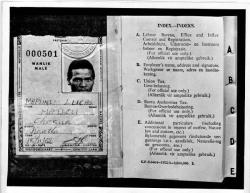
Published date
23 July 1986
In July 1986, South Africa was in a state of martial law, with a nation-wide State of Emergency having been declared in June of the same year. To counter the escalating international condemnation that was taking place, the government lifted the obligatory carrying of passbooks by Black people on 23 July 1986. The pass system was, however, not abandoned altogether, Black men and women were still required to have passbooks although they were no longer expected to carry them at all times and failure to present a passbook on demand by the police was no longer a criminal offense.
From the mid-1950s the government had began to coerce rural woman into accepting passbooks - this sparked resistance in the rural areas, with massive and sustained revolts in Zeerust and Sekukuneland in 1958. It was a protest against the pass laws in 1960 that prompted the police to shoot and kill 69 people in what became known as the Sharpeville massacre, leading to South Africa's first state of emergency and the banning of a host of anti-apartheid organisations, including the African National Congress(ANC)and Pan Africanist Congress(PAC).
Visit the feature on the pass laws in South Africa from the 1800s – 1900s.
References
South African History Online, ‘Pass Laws in South Africa 1800s ”“ 1900s’,From:South African History Online,[online] Available at: www.sahistory.org.za, [Accessed: 10 July 2014]| Boddy-Evans A. ‘Women's Anti-Pass Law Campaigns in South Africa’From: African History [online,] Available at www.africanhistory.about.com,[Accessed: 10 July 2014]|Alistair Boddy-Evans, ‘Blacks (Abolition of Passes and Co-ordination of Documents) Act No 67 of 1952’, From: African History [online], Available at: africanhistory.about.com,[Accessed: 10 July 2014]